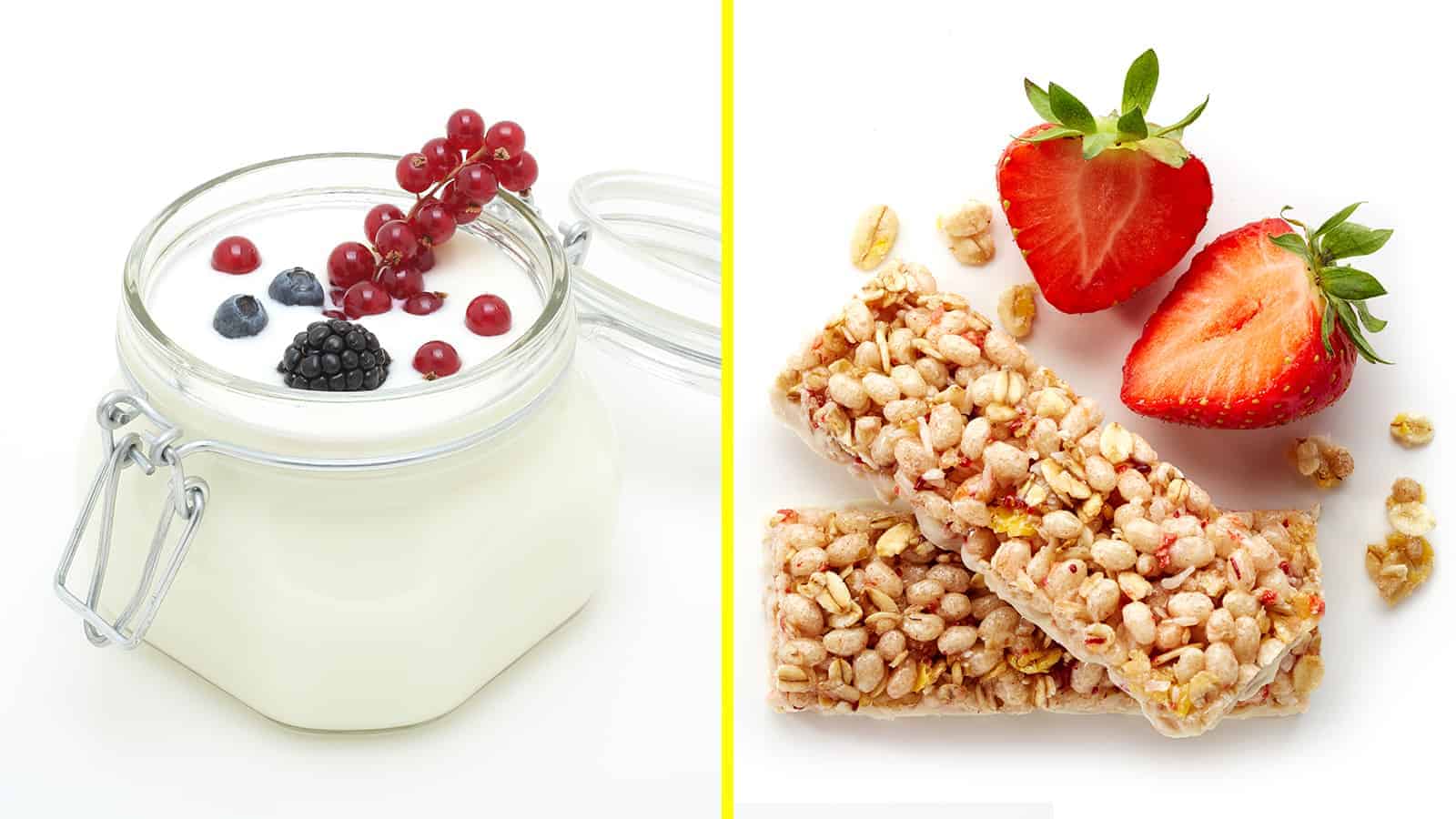Do you know what “health foods” are actually healthy? Can you distinguish between the diet foods that make you gain weight and those that help you to lose weight?
If your strategy in this regard mainly involves searching for foods that advertise their healthy nature on the box, T.V., or somewhere else, it may be time to reconsider. We’ll provide some tips on this later on.
Many so-called “diet” foods are not healthy at all. Many producers of these “diet” products have one goal – and one goal only – in mind: handing your hard-earned cash over to their shareholders.
In other words, don’t assume that the food industry (or any other industry, for that matter) has your best interests at heart. Plenty of so-called “diet” foods will render one’s weight loss efforts worthless in this respect and actually make you gain weight.
In this article, we’re going to talk about the devious nature of the food industry. While our main topic revolves around sham diet foods, we’ll also discuss – at length – why you should take what you put into your mouth entirely into your own hands.
Exhibit A: The “Low Fat” Scam
“After 1980, the low-fat approach [to dieting] became an overarching ideology, promoted by physicians, the federal government, the food industry, and the popular health media. Many Americans subscribed to the ideology of low fat, even though there was no clear evidence that it prevented heart disease or promoted weight loss.” – Ann F. La Berge, “How the Ideology of Low Fat Conquered America” (Source)
The food industry can’t be trusted. By the “food industry,” we mean the manufacturers, marketers, supposed food science “experts,” and even the government officials who shape public health policies. These people get paid millions – probably billions – bombarding us with T.V. advertisements espousing the benefits of low-fat diets.
- “Don’t worry about sugar.”
- “Fat makes you fat.”
- “Stay away from the butter and oil.”
- “Bread makes you full.”
If you were around the in the early to late ’90s, then you know all too well about the food industry’s omnipresent “low-fat” marketing and public service campaigns. It was B.S. All of it. Worse yet, people in high places knew that it was all a charade.
The Low-Fat Scam Goes Way Back
While the marketing of low-fat diets (based on faux science) reached a crescendo in the ’90s, the genesis of the story that is low-fat dieting actually goes all the way back to the 1960s. According to an article by Oxford University and published in the Journal of the History of Medicine and Allied Sciences:
‘By the 1960s, the low-fat diet began to be touted not just for high-risk heart disease [the initial aim], but as good for the whole nation.”
Food scientists responsible for helping to safeguard the health of the American public were paid to do the industry’s bidding. Government officials ignored evidence, as did physicians. Amid it all, the media – from the daily press to the toilet paper tabloids all too eager to publish “Do this and lose weight!” content for a quick buck.
Congressmen, senators, and others who shape health policy seemingly didn’t want to ruffle the feathers of the multi-billion dollar industry. After all, politicians have received roughly $100 million from the food industry over the last seven presidential elections alone.
Around the same time, we could supposedly eat about as much low-fat cakes, cookies, and ice cream as we wanted. Companies like SnackWells – producing low-fat snacks like cookies and crackers – raked in millions of dollars in profit. In the interim, the sugar industry decided it’d be a good idea to falsify their research and mislead the public. But doing so, they could continue to take in the cash as the low-fat craze peaked in the mid-90s.
The point is twofold: (1) Never (ever) rely on the good faith of the food industry. They don’t care about you. (2) Take your health into your own hands – and keep it there.
5 Diet Foods That Make You Gain Weight
“Diet foods, such as those labeled “low-fat,” “low-calorie,” or “fat-free,” are specifically marketed to people looking to shed excess weight.” – Jillian Kubala, MS, RD (source)
Now that we’ve thoroughly crushed the wretched food industry, let’s turn our attention to the article’s main focus. Here are five so-called “diet” foods that actually make you gain weight and a recommendation for what to eat (or drink) instead!
1. Diet Soda
While not technically a food, diet soda is perhaps this list’s most significant health mistake. The research is quite clear: diet soda drinkers are usually not healthier than the rest of the population. In fact, many studies find the exact opposite to be the case.
In a 2017 meta-analysis (an examination of data from multiple studies) of 30 independent studies and seven random control trials (RCTs) published in the journal Canadian Medical Association, researchers came to the following conclusions about artificial sweeteners (such as those included in diet soda):
(1) Evidence from RCTs does not support the benefits for “nonnutritive sweeteners” for weight management.”
(2) Frequent consumption of artificial sweeteners is linked to higher body mass index (BMI) and larger waist circumference.
(3) Routine use of nonnutritive sweeteners is linked to a higher risk of cardiometabolic disease. Cardiometabolic disease or cardiometabolic syndrome (CMS) is a set of metabolic dysfunctions that include: central adiposity (a combination of subcutaneous and visceral fat in the lower torso), dyslipidemia (an imbalance of fats in the blood), hypertension, and impaired glucose tolerance.
Try this: Go with a fresh fruit smoothie or keep things simple and healthy with a tall glass of water.
2. Low-Fat Yogurt
In yet another arrow in the long-dead corpse that is low-fat dieting, low-fat yogurt – a favorite among many dieters – may actually be less healthy than full-fat yogurt. The same applies to other low-fat dairy products as well, including milk and cheese.
Why is low-fat yogurt unhealthy? Much of the blame is the tons of added sugar that go into the products. For example, just one cup of Yoplait low-fat vanilla yogurt contains nearly 30 grams of sugar – more than you’ll find in eight ounces of Coca-Cola.
In a massive 11-year study of over 18,000 healthy women published in The American Journal of Clinical Nutrition, scientists found that consumption of high-fat dairy products was linked with weight gain prevention or weight loss in middle-aged and elderly women. However, women who ate more low-fat dairy products had a greater risk of becoming overweight or obese.
Try this: Greek-style yogurt with fresh cut fruit.
3. Low-Calorie Breakfast Cereal
As is the case with low-fat yogurts, low-calorie breakfast cereals are loaded with added sugars. This shameless inundation of sugar ultimately renders any potential health benefit mute. Refined sugars are linked not only to weight gain, but several chronic diseases, including type 2 diabetes, heart disease, and even cancer.
Unsurprisingly, cereal manufacturers are among the most egregious offenders regarding the deliberate misleading of consumers. For instance, marketers of these products often include things like “Low-fat!” and “Whole grains!” in the too-often-successful attempt to bamboozle health-conscious consumers. Often, the top two items under the ingredients section of the label read as follows: “refined grains; sugar.”
In one particularly infuriating case, Kellogg’s advertised that their Frosted Mini-Wheats cereal could enhance children’s cognitive function, attention, and memory. The Federal Trade Commission (FTC) disagreed, forcing the company to pay a multi-million-dollar class action lawsuit.
Try this: A bowl of shredded whole wheat with fresh fruit or a bowl of oats with the same.
4. Low-Fat Frozen Dinners
With few exceptions, frozen meals are among the worst things one can put into his or her body. They’re loaded with sodium, saturated fats, and calories. They lack many minerals and vitamins. Frozen meals are also heavily processed and stripped of nutrition of increase shelf life.
But what about low-fat frozen dinners? Again, you’ll find no benefit to eating low fat if the product has high sodium, refined carbohydrates, and additives or preservatives. This happens to be the case for the vast majority of frozen meals.
Try this: If you still prefer frozen meals, look for Amy’s Kitchen brand, a favorite of some nutritionists and dietitians.
5. Energy Bars/ Protein Bars
Energy bars and protein bars are a common meal replacement or grab-and-go food because of their convenience and advertised nutrition. While some of these bars are indeed healthy, it is important to read the labels. Some of these products are loaded with extra sugar and calories.
Some people make a big mistake by snacking on energy or protein bars while sitting at a desk for eight hours. Many manufacturers design these products as either a meal replacement or a supplement to working out, hence their calorie density. Snacking on something that’s meant to replace a multi-course meal is never a good idea.
Try this: When looking for a healthy energy/protein bar brand, look no further than Larabar. Larabar products contain no added sugars and even make some organic superfood bars!



















